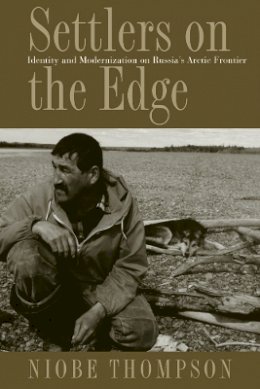
Stock image for illustration purposes only - book cover, edition or condition may vary.
Settlers on the Edge: Identity and Modernization on Russia´s Arctic Frontier
Niobe Thompson
FREE Delivery in Ireland
Description for Settlers on the Edge: Identity and Modernization on Russia´s Arctic Frontier
Hardback. Deeply researched and eloquently written, Settlers on the Edge .. makes an important and long-overdue contribution to our understanding of who belongs in the North. -- Farley Mowat Num Pages: 320 pages, Illustrations, maps. BIC Classification: 1DVUA; GTB; JFFN; JHM. Category: (G) General (US: Trade). Dimension: 5817 x 3887 x 23. Weight in Grams: 558.
Based on extensive research in the Arctic Russian region of Chukotka, Settlers on the Edge is the first English-language account of settler life anywhere in the circumpolar north to appear since Robert Paine's The White Arctic (1977), and the first to explore the experiences of Soviet-era migrants to the far north. Niobe Thompson describes the remarkable transformation of a population once dedicated to establishing colonial power on a northern frontier into a rooted community of locals now resisting a renewed colonial project. He also provides unique insights into the future of identity politics in the Arctic, the role of resource capital and the oligarchs in the Russian provinces, and the fundamental human questions of belonging and transience.
Product Details
Publisher
University of British Columbia Press Canada
Place of Publication
Vancouver, Canada
Shipping Time
Usually ships in 7 to 11 working days
About Niobe Thompson
Niobe Thompson is a documentary filmmaker, a partner in Clearwater Media, and a research associate at the Canadian Circumpolar Institute. He also teaches in the Department of Anthropology at the University of Alberta.
Reviews for Settlers on the Edge: Identity and Modernization on Russia´s Arctic Frontier
Settlers on the Edge benefits from a prose style that, while sophisticated, is clear and free of jargon. Thompson presents a number of insights about late Soviet and post-Soviet society in general, and certainly about Chukotka itself. The stories of his informants are often affecting. Students and specialists in Russian history and arctic studies will find this is a most welcome addition to their libraries, as will anyone interested in anthropological research and colonial and post-colonial studies. It should appeal to a wider audience as well.
John McCannon, Southern New Hampshire University
The Soviet and Post-Soviet Review, Vol. 38 (2011)

